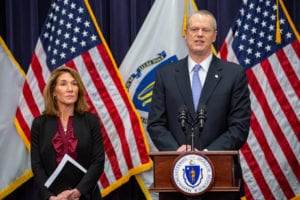Who is a member?
Our members are the local governments of Massachusetts and their elected and appointed leadership.

Gov. Charlie Baker, joined by Lt. Gov. Karyn Polito, announces a three-week suspension of school operations for educational purposes at all public and private elementary and secondary (K-12) schools in the Commonwealth and a series of new guidance and legislation in response to COVID-19 at the State House on March 15, 2020. [Photo: Joshua Qualls/Governor’s Press Office]
The legislation would:
• Amend the existing statute that authorizes town moderators to postpone town meetings by 30 days during a “public safety emergency” by adding “public health emergency” as a reason that permits postponement.
• Permit town select boards to postpone town meetings beyond the statutory June 30 deadline (end of fiscal year) when the governor has declared a state of emergency and conditions prevent the completion of a town meeting.
• Permit select boards, at local option, to temporarily adopt lower quorum rules.
• Permit continued month-to-month spending into fiscal 2021 by towns based on the prior fiscal year budget with approval of the Division of Local Services during a state of emergency. The month-to-month authorization would continue so long as a state of emergency prevents the adoption of a budget. Cities have similar authority under existing state law.
• Permit towns to access their free cash balance for fiscal 2021 spending with approval of the Division of Local Services. This would be based on the July 2019 certified balance and could continue until a fiscal 2021 budget is adopted.
• Permit municipal spending from revolving funds at the level set by their fiscal 2020 appropriation until a fiscal 2021 budget is adopted.
• Authorize a three-year amortization period for deficit spending incurred as a result of the COVID-19 crisis. The default rule would require a fiscal 2021 tax rate to provide for one-year amortization, and this change would follow the 2015 precedent for snow removal costs.
School and other closures
Gov. Baker also announced a three-week suspension of school operations for educational purposes at all public and private elementary and secondary (K-12) schools in the Commonwealth beginning Tuesday, March 17, as well as a number of other emergency actions.
“We know that a lot of the measures we are putting into place, including mandatory school closures and prohibiting gatherings of 25 people or more, will cause disruption in people’s day-to-day lives,” Gov. Baker said. “With the steps we are taking today, we can ensure residents can still access key state services while taking necessary precautions to limit the spread of COVID-19.”
The suspension of educational programming would not necessarily affect the availability of school buildings for the provision of food or other essential non-educational services. The administration will provide additional guidance as the end of the closure approaches.
The administration said it is “critical” that students and their families, as well as school staff, stay home as much as possible and strictly follow social distancing guidelines.
School staff are urged to plan for “how best to equitably provide alternative access to student learning opportunities during this period and potentially beyond.” School personnel are also urged to find ways to ensure, to the greatest extent possible, that families have access to essential non-academic services for their children – particularly special education and food services.
The Department of Elementary and Secondary Education will work with school districts to develop strategies and resources to sustain learning and vital services throughout this closure period. The DESE has received a partial waiver from the U.S. Department of Agriculture providing greater flexibility regarding food service in certain districts with higher concentrations of low-income students, and the department is pursuing additional waivers for the remaining schools and districts.
All non-emergency state employees working in Executive Branch agencies were told not to report to their workplaces on March 16 and 17. The administration is working to expand alternative work arrangements for the executive branch workforce and develop plans to continue to provide essential state government services.
All commercial insurers, self-insured plans, and the Group Insurance Commission are required to cover medically necessary telehealth services related to COVID-19 testing and treatment. Insurers must do so without requiring cost-sharing of any kind, such as copays and coinsurance, for testing and treatment. Additionally, insurers cannot require prior authorization for these services.
The latest information and guidance regarding COVID-19 is available at mass.gov/COVID19.
• Download An Act to Address Challenges in Town Governance Resulting from COVID-19